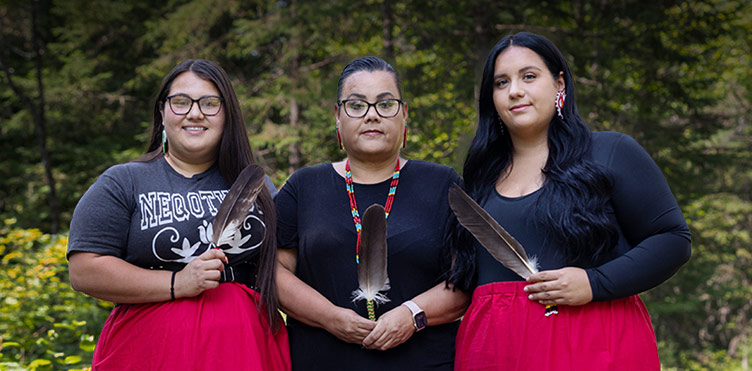
Shelley Solomon experienced many challenges around recruiting educational assistants to Neqotkuk (Tobique First Nation) to earn their teaching certification, then teach in the community.
She oversaw this work in her role as executive assistant to Neqotkuk’s Director of Education and found it challenging, as most educators “[are] non-Native, and it takes a while for them to connect with the kids.”
Everything changed when Shelley discovered the newly revamped Wabanaki Bachelor of Education program. She immediately saw how it could bridge this gap and how it could enable Neqotkuk community members to study and become educators in their own communities.
This inspiration led her to enrol in the program alongside her daughters Dorian and Heaven. They were all among its first graduates in the fall of 2024 and hope to inspire others to do the same.
“We want to inspire more Aboriginal teachers to go, [and] to come back and teach their children,” says Shelley.
The WBEd degree is administered by the Mi’kmaq-Wolastoqey Centre through the guidance of the UNB Elders Council and takes a unique approach, offering flexibility and hands-on learning experiences through the lens of Mi’kmaw and Wolastoqey languages and culture. The four-year program’s instructors include Wabanaki Elders and Knowledge Keepers, who share their deep cultural knowledge with participants.
With a focus on teaching and learning Wabanaki languages, program participants earn Mi’kmaw and Wolastoqey language certificates as part of the program, and the practicum involves teaching language in provincial or community schools.
“I’ve never seen a program that was so infused with our perspectives and our worldview,” says Shelley. “It’s just those full circle moments where we’re able to connect. It was like nation building, in a sense, because as Indigenous people in New Brunswick, we were able to create that community.”
Heaven says the program was the type of educational experience she had been looking for. She was previously enrolled in a teaching certificate program but found the experience isolating and too broad to address what she was really interested in.
“I always knew I wanted to be involved in either Indigenous studies or teaching the loss of language,” says Heaven, adding that these courses didn't feel like the right fit. “It wasn’t what I wanted to learn; it wasn’t my interest. But it was what I had to do to get a teaching degree.”
For Shelley and Heaven, the program has set their sights on attaining even higher levels of education. Both are pursuing their masters of education in educational administration and leadership. Heaven also says it has done more than just teach them how to be teachers.
It’s given them the ability to inspire a new generation of educators based in their community, who can combine their existing cultural knowledge with new teaching skills to educate and pass on knowledge to their community’s next generation.
“We’ve got those stories and those moments that are so unique, but that are so beneficial as a teacher because it’s those lessons that we can share with our students and also with our peers,” says Heaven.